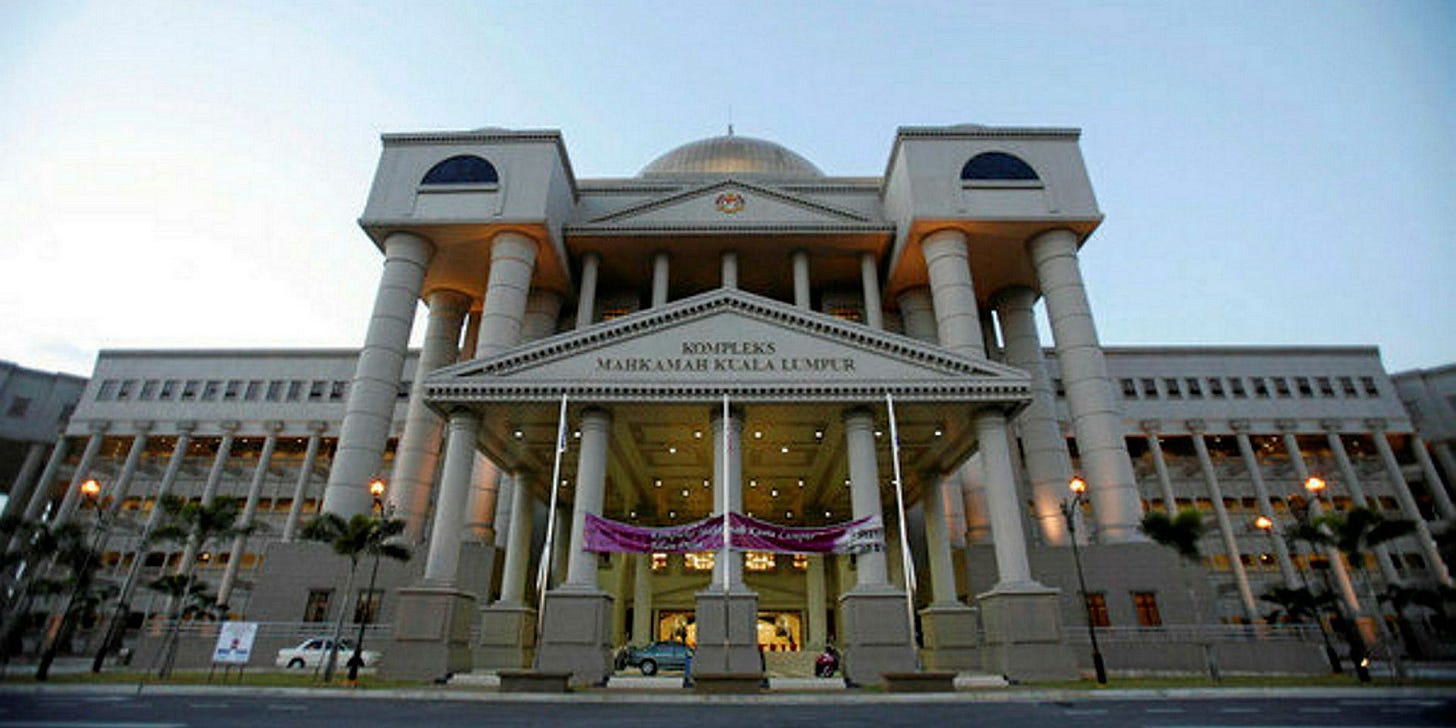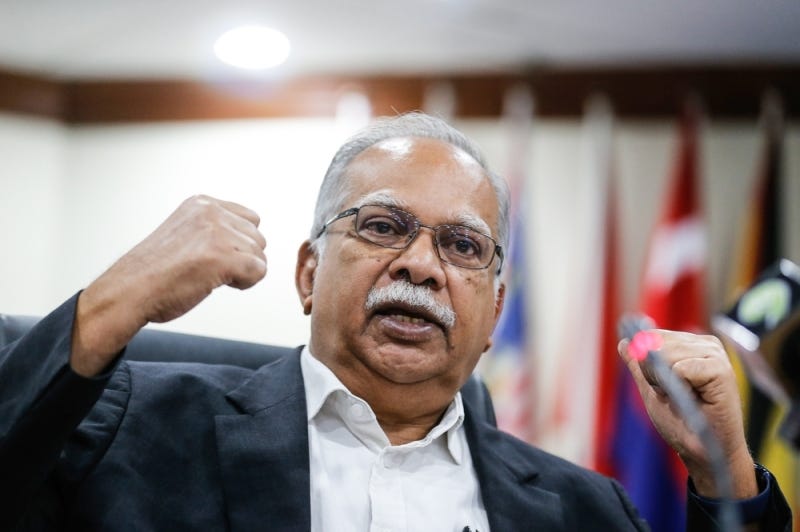Guest Editorial: Judicial failures and the need for urgent reform in Malaysia
Prof. Dr. Ramasamy
The claim that prosecutions were rushed under former Prime Minister Tun Dr. Mahathir Mohamad’s administration, beginning in 2018, raises significant concerns about Malaysia’s judicial and prosecutorial integrity.
These cases, particularly involving high-profile UMNO leaders such as Najib Razak, his wife Rosmah Mansor, and current UMNO president Ahmad Zahid Hamidi, have exposed deep flaws in how corruption cases are handled.
If these prosecutions were indeed hastily conducted, one must ask why current Prime Minister Anwar Ibrahim, then closely allied with Mahathir, did not raise objections.
Even if Anwar was not the prime minister at the time, his regular interactions with Mahathir would have provided ample opportunities to highlight the dangers of rushed prosecutions.
The question now is, why raise this issue only after significant damage has been done and public trust eroded?
Anwar’s recent remarks about rushed prosecutions appear to be a deflection from mounting criticism over the lack of substantial judicial and institutional reforms under his leadership.
Critics argue that his government has been lenient on prominent UMNO figures, many of whom have seen charges dropped or cases dismissed without proper accountability. For example:
• Rosmah Mansor was recently freed from corruption charges.
• Ahmad Zahid Hamidi received a controversial discharge not amounting to acquittal.
• Musa Aman, former Sabah governor, was cleared in 2020, two years before Anwar assumed office.
These cases fuel a perception that political expediency outweighs justice.
Anwar’s insistence that he had no hand in these outcomes—claiming constraints on judicial appointments or royal prerogatives—rings hollow.
As Prime Minister, Anwar appoints the Attorney General (AG), who directly oversees public prosecutions.
If the AG is failing to act impartially or effectively, the power to replace them lies squarely with Anwar.
It is not enough to lament systemic issues without taking concrete steps to resolve them.
The disparity between how corruption cases against powerful politicians are handled versus the harsh penalties ordinary Malaysians face for minor offenses highlights systemic failures.
This two-tier justice system erodes public confidence and reinforces the belief that the rich and politically connected act with impunity.
To restore trust, Anwar must prioritize judicial reforms. Key steps should include:
1. Separating the Public Prosecutor’s Office from the Attorney General’s Chambers to ensure prosecutorial independence and eliminate conflicts of interest.
2. Strengthening anti-corruption institutions to function free from political interference.
3. Implementing transparent judicial appointments that inspire public confidence in the courts.
Without these reforms, Malaysia risks becoming a state where political survival takes precedence over justice.
Anwar’s repeated claims of helplessness are increasingly viewed as excuses rather than justifications.
If he continues to avoid meaningful action, it will be a tacit admission of a lack of political will.
Ultimately, Malaysia cannot afford to allow political expediency to compromise justice and accountability.
The urgency for reform has never been greater. Failure to act decisively risks perpetuating systemic failures and further undermining public trust. The time for action is now—anything less is a betrayal of the public’s faith in leadership.
Prof. Dr. P Ramasamy
Malaysian, 75 years of age. Former professor of political economy UKM. Former Senior Research Fellow, ISEAS. Former Visiting Professor, University Kassel, Germany. Deputy Chief Minister Penang, 2008-2023. Former member of parliament, 2008-2013. Three terms Perai state assemblyman. Former Chairman of Penang Hindu Endowments Board. Involved in peace talks in Aceh and Sri Lanka. International peace consultant. Chairman of political party Urimai.
Subscribe Below:






The fact of the matter is that once the vaccum of the imperial power (Britain) set in, only those with real knowledge and a commitment to justice (Like LKY, Ramani and a handful of others) demonstrated a capacity to deal with the law in terms of justice remained.
The much celebrated DYMM Raja Azlan Shah was not one of these, However the sychophants (and there are many in Malaysia) began to hail him as a great jurist and judge and elevated the man to that hallowed position of Lord President. He was a lightweight as a practitioner. Indolent in office as most royals are when tasked with a human job.
Azlan Shah plagiarised Justice Broomfield (the man who jailed Gandhi for sedition in 1921) in one of his judgments. He did the same in his other judgments too. Such is the nature of the Malaysian judiciary as it evolved after independence. Such is also the nature of Malayia's middle classes. Corrupt, sychophantic and feeble of mind.
How could one forget the likes of the late NH Chan (judge). His private and personal conduct spilling on to public courtesy of his enraged and betrayed wife. His choice of English precedents in his judgment were indicative of how ittle he actually knew of the law and his work as a judge.
His constant reference in adoration to Lord Denning as a "great judge" was parroting. Denning was an insufferable racist and bigot. He did indeed create some semnial precedents in law but he was not just. And there is a difference between justice and the law. The Denning precedents he made reference to were often out of context and out of relevance.
Tun Salleh the much celebrated "hero" of the revolution was another nut. A man who jutified intervention by the executive into judicial matters and into the bench through his personal conduct and meddling in matters where angels fear to tread.
To suddencly "discover" that there are issues that bedevil the bench and those who ascend to it as judges is about as intelligent as saying "Its raining" whilst standing under a leaky roof.
Like the fish, the rot in corruption, breakdown in law and order, politics and crime generally begins at the top.
No Ramasamy, you have not discovered fire and your commentary in this regard is pallid. It is no erudite piece of scholarship however hard you try. You have climbed that ladder of academia to some height. That of itself is not an education.
You still can contribute to helping mold Malaysia into the nation you'd like to see it become. But such mediocre repetions of corruption in government does not assist. An alternative path well articulated is what would suffice. I don't think you have one.
DS Najib was set up. He was set up by those forces of the NED and the Soros foundation because he took an independent path to governing Malaysia and refused to back away from closer relations with China.
The judiciary joined in because they were tainted. You must have sen it in the attacks on Lingham. There was no shortage of blind prejudice being served by retired judges and sitting ones too from the sidelines. They were corrupted long before they retired from the bench.
Those who went along with crucifying DS Najib like that group of Malayian lawyers at Bersih, C4 and other petty foeign funded groups have already secured their permanent residency in the UK, Australia, New Zealand and the US. Two "women of courage" amongst these have already done so.
“The illiterate of the 21st century will not be those who cannot read and write, but those who cannot learn, unlearn, and relearn. ”
― Alvin Toffler (4 Oct 1928- 27 June 2016)
He who will not reason, is a bigot; he who cannot is a fool; and he who dares not is a slave. Sir William Drummond (26 Sept 1769-29 March 1828)
. Attachment is the great fabricator of illusions; reality can be attained only by someone who is detached. Simone Weil (3 February 1909 - 24 August 1943)
If Anwar possesses all or even one of these mental capacity, if he makes some headway to right the wrong in the legal cases, otherwise it is only a distance dream.
The difficulty and obstacles ahead are unsurmountable as expressed by
“It ought to be remembered that there is nothing more difficult to take in hand, more perilous to conduct, or more uncertain in its success, than to take the lead in the introduction of a new order of things. Because the innovator has for enemies all those who have done well under the old conditions, and lukewarm defenders in those who may do well under the new. This coolness arises partly from fear of the opponents, who have the laws on their side, and partly from the incredulity of men, who do not readily believe in new things until they have had a long experience of them.”
― Niccolò Machiavelli, The Prince(3 May 1469 - 21 June 1527)